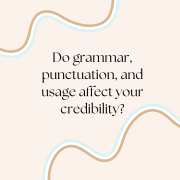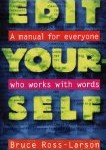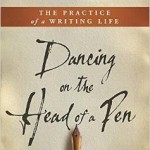Do your grammar, punctuation, and usage affect your credibility?
Does the quality of your writing matter? It looks like it does. When I asked “Does a writer’s grammar, punctuation, or usage errors damage that writer’s credibility in your eyes?”, an amazing 100% of respondents said “yes” in response to the survey on my blog and in my newsletter.
Specifically, they gave the following answers to my multiple-choice question.
0% No, I don’t notice errors
0% No, I don’t care
26% Yes, but I forgive small mistakes, especially in social media posts
74% Yes, they damage the writer’s credibility
I imagine that my readers are more critical than the general population. Still, these numbers should make all of us, including me, pay closer attention to how we write.
Respondent comments on bad writing
As one respondent commented, “Having your reading disrupted by a misspelled word or badly written sentence is like having air suddenly let out of a balloon. It makes me question the writer as well as the content.” Another reader said, “it reflects poorly on the writer and shows lack of attention to detail.” On a similar note, one person wrote, “There’s always that nagging feeling: if they didn’t care enough to proofread this, where else are they cutting corners? I try to be charitable because I too make mistakes, but it really bugs me.”
In their comments, readers showed some tolerance for mistakes. Here’s one example, “To me, it shows the writer is not detailed enough to review their input before hitting “go” – drives me crazy. That being said, I hit the wrong key often when texting and sometimes miss it before sending, so I have a small tolerance for those sort of errors.”
Believe it or not, despite my weekly “Mistake Monday” feature on the Investment Writing Facebook page, I fall into the 26% of people who tolerate small mistakes, especially in social media.
The worst mistakes?
The second question in my survey asked, “What is the worst mistake that writers make? Why is this mistake bad?”
Popular answers included spelling mistakes, mistakenly using “it’s” as the possessive form of “it,” and failing to proofread.
Here are more answers to my question about the worst mistakes:
“It’s a toss-up between thinking they are texting and using texting acronyms and overloading their writing with technical jargon.”
“Writing with very little thought and planning… poor sequencing of ideas, incomplete sentences, stream of consciousness, no clear call to action. When that’s the output, why bother?”
“Since I read almost no fiction–in my job, I don’t have to because what I see and hear no writer could make up–I confine my comment to non-fiction. Embedding numbers inside paragraphs abuses most readers because it asks them to ‘see’ relationships between and among numbers that can be shown much more easily with charts and graphs.”
“Using too many words. I want to get the point, learn the lesson without reading useless words.”
Dave Spaulding on writing mistakes
I’m not the only person raising these questions in the world of investment management. You can read Dave Spaulding’s “Should GIPS verifiers correct grammar? Spelling?”
When Dave sees mistakes, he recommends changes. In his blog post, he says, “On occasion, I’ve discussed this with our clients, and in every case the client has been very clear that they welcome my comments. Most want their materials to be as correct in all respects as possible.” That’s good news.
March 13, 2017 update: The original version of this post linked to my original survey. I updated the post to focus on the survey results, which I’d published in my monthly e-newsletter (click to subscribe).






Excellent post on the connection between web writing and credibility recently by Nielsen Norman Group: “A Link is a Promise” http://bit.ly/1Bk9zx1.
Sorry; wrong link for “A Link is a Promise.” The correct link is http://bit.ly/1AJcCx8.
Thank you, Susan. I enjoy NNG’s work.